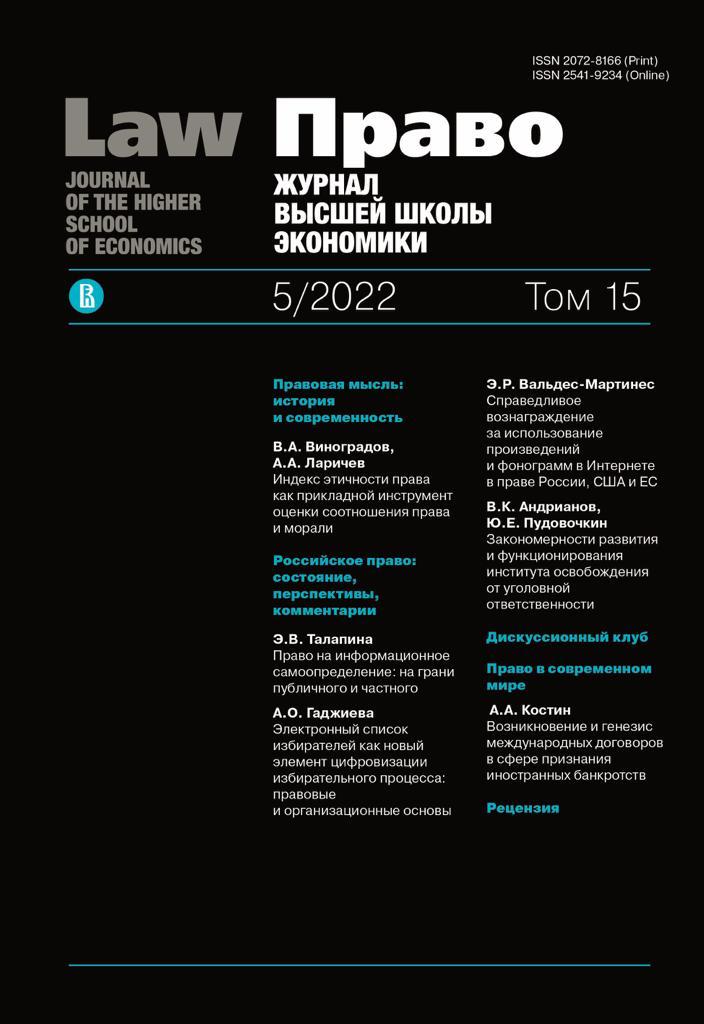Закономерности развития и функционирования института освобождения от уголовной ответственности
Аннотация
Возникновение, развитие и функционирование института освобождения от уголовной ответственности характеризуется закономерностями. Их выявление и описание является ключом к пониманию его сущности, эволюции и современного состояния. Несмотря на многочисленные работы, посвященные исследованию института освобождения от уголовной ответственности, попыток изучения его социально-правовой природы через закономерности еще не предпринималось, что обуславливает необходимость настоящего исследования. Работа основана на устоявшихся в отечественной науке теоретических учениях о социальной, исторической и криминологической обусловленности уголовного закона и уголовной политики. Авторы придерживаются диалектического взгляда на развитие уголовного права и его институтов, предполагающего выявление и изучение лежащих в основе такого развития противоречий общественного и правового развития. Для изучения закономерностей развития и функционирования института освобождения от уголовной ответственности использованы историко-правовой, статистический, аналитический и документальный методы. В работе выявлены и проанализированы закономерности института освобождения от уголовной ответственности, характеризующие: гуманизацию уголовного права; развитие уголовного права как средства социального управления; обусловленность содержания норм уголовного права социальным поведением индивидов; зависимость типа урегулирования уголовно-правового конфликта от сложившейся в обществе концепции взаимоотношений государства и личности; социально-исторический генезис института; тенденции внутреннего развития института; социально-политические тенденции дальнейшего развития института освобождения от ответственности и его функционирования на практике. Авторы приходят к выводу, что институт освобождения от уголовной ответственности, закономерно возникший и развивающийся как гуманистический ответ на недостатки и издержки уголовного наказания, ориентированный на исправление малоопасных преступников и возмещение причиненного преступлением вреда, в настоящее время функционирует как диалектическая противоположность законодательной тенденции увеличения масштабов криминализации, внутрисистемный уголовно-правовой механизм сдерживания и преодоления криминализационной избыточности уголовного закона, что искажает социально-правовую природу и предназначение данного института.Литература
Alikperov H.D. (1992) Crime and compromise. Baku: Elm, 193 p. (in Russ.)
Afanasova M.S. (2020) Compensation for damage from a crime: history and modernity (evolution of Russian legislation). Probely v rossiyskom zakonodatel'stve = Gaps in Russian Legislation, no. 5, pp. 200-204 (in Russ.)
Balafendiev A.M. (2016) Exemption from criminal liability in connection with positive post-criminal behavior: socio-legal prerequisites, essence and systematization of types. Candidate of Juridical Sciences Thesis. Kazan, 255 p. (in Russ.)
Bavsun M.V. (2002) Expediency in criminal law. Candidate of Juridical Sciences Thesis. Omsk, 186 p. (in Russ.)
Blagov E.V. (2018) The basis of exemption from criminal liability. Aktual'ny'e problémy rossiyskogo prava = Issues of Russian Law, no. 7, pp. 161-168 (in Russ.) DOI: https://doi.org/10.17803/1994-1471.2018.92.7.161-168
Burlakov V.N. (2011) Individualization of criminal punishment: law, theory, practice. Saint Petersburg: Juridical Center Press, 128 p. (in Russ.)
Chistyakov O.I. (ed.) (1986) Russian legislation of 10-20th ages. Moscow: Juridicheskaya literatura, vol. 1, 519 p. (in Russ.)
Egorov V.S. (2002) Theoretical aspects of exemption from criminal liability. Moscow: Social Institute Press, 279 p. (in Russ.)
Endoltseva A.V. (2005) Institute of exemption from criminal liability: theoretical, legislative and law enforcement aspects. Doctor of Juridical Sciences Thesis. Moscow, 396 p. (in Russ.)
Kaufman M.A. (2021) The basis of exemption from liability. Zhurnal rossiyskogo prava = Journal of Russian Law, no. 1, pp. 143-156 (in Russ.)
Kelina S.G. (1974) Theoretical issues of exemption from criminal liability. Moscow: Nauka, 231 p. (in Russ.)
Korobeev A.I. (2019) Russian criminal law policy: from genesis to crisis. Moscow: Yurlitinform, 352 p. (in Russ.)
Kostrova M.B. (2017) Criminal-legal mechanisms of compensatory nature as one of the trends of modern economically oriented criminal policy of Russia. Ugolovnoe pravo = Criminal Law, no. 4, pp. 73-79 (in Russ.)
Lopashenko N.A. (2009) Criminal policy. Moscow: Wolters Kluwer, 579 p. (in Russ.)
Matveeva Ya. M. (2015) Institute of exemption from criminal liability in Russian criminal law: modernization and search for alternative ways to resolve a criminal law conflict. Candidate of Juridical Sciences Thesis. Saint Petersburg, 220 p. (in Russ.)
Nazarenko G.V. (2012) Criminal law policy: trends and prospects. Srednerusskiy vestnik obshhestvennyh nauk = Central Russia Bulletin of Social Sciences, no. 3, pp. 156159 (in Russ.)
Pashin S.A. (2016) Draft of amendments to Criminal Code and Code of Criminal Procedure to provide victim, suspect, accused with possibility of reconciliation. Precedenty i pozicii = Precedents and Positions, no. 5, pp. 15-21 (in Russ.)
Poniatovskaya T.G. (2015) Do the conditions of exemption from criminal liability need formal signs? Obshhestvo i pravo = Society and Law, no 4, pp. 93-98 (in Russ.)
Rarog A.I. (2014) Repressive inclination of Russian criminal policy. Kriminologicheskij zhurnal Baikal'skogo gosudarstvennogo universiteta e'konomiki i prava = Criminology Journal of Baikal State University of Economics and Law, no. 3, pp. 88-95 (in Russ.)
Senina E.N. (2022) Mediation and restorative approach in resolving criminal law conflicts. Vestnik RUDN = RUDN Bulletin, no. 2, pp. 464-484 (in Russ.) DOI: https://doi.org/10.22363/2313-2337-2022-26-2-464-484
Smirnov A.M. (2018) On the question of excessive humanism of the Russian criminal policy. Obrazovanie i nauka v Rossii i za rubezhom = Education and Science in Russia and abroad, no. 11, pp. 310-314 (in Russ.)
Sundurov F.R. (2012) Exemption from criminal liability in the system of measures of criminal legal impact. Vestnik TISBI = Bulletin of TISBI, no. 2, pp. 152-158 (in Russ.)
Zvecharovsky I.E., Ivanov A.L. (2015) Exemption from criminal liability. Ugolovnoe pravo = Criminal Law, no. 4, pp. 13-18 (in Russ.)
Copyright (c) 2022 Право. Журнал Высшей школы экономики

Это произведение доступно по лицензии Creative Commons «Attribution-ShareAlike» («Атрибуция — На тех же условиях») 4.0 Всемирная.


















